- ▼FEEDING A VERY UNDERWEIGHT, NURSING MARE
-
Customer: “I recently bought two mares (4 weeks ago), one who’s approximately 3 months pregnant the other who’s a rescue that’s nursing and very underweight. We’re currently feeding her beet pulp mush with black oil sunflower seeds and a product called haystack. I want to start both mares on super gain and or Horse Guard. My curiosity is, do I continue with the beet pulp with your products? Also, will super gain be enough to put some weight on for winter (my main concern). We had her teeth floated last week and the vet recommended foal and mare feed. She’s been on that about 5 days along with the beet pulp much. I’m trying to simplify the feed but with the most/best nutrients possible. I’m new to the horse world so any advice is welcomed! Thank you for your time!”
Answer by Ph.D. Equine Nutritionist, Kelsey Johnson Nonella: You can continue feeding the beet pulp with our products or you may consider feeding the haystack specials blend with our products (which it recommended to be fed ½ to 11/2 pounds per 100 lb body weight in order to help put weight on, so an average horse would receive 5-15 pounds). For the mare that is very underweight, I would recommend putting her on Super Weight Gain, the mare and foal, and some haystack feed. In addition if she isn’t already on alfalfa hay, feeding both grass hay and slowly start introducing alfalfa into her diet. Feed her all she can eat of grass hay. The key with the skinny mare is to increase her calorie content. Super Weight Gain will provide her with fat and protein, as well as meet any vitamin and mineral deficiencies she has, and help her to get more out of the feed she is consuming, but she also need the calorie content of her total diet increased. For the other pregnant mare, if she is in good body condition you can feed her Horse Guard and a little mare and foal feed (to meet the increase levels of Calcium and phosphorous), along to all she can eat grass hay, and if you like a little alfalfa. If you have any other questions I would be more than happy to answer them. Welcome to the world of horses. - ◄CAN I FEED SUPER GAIN AND TRIFECTA TOGETHER TO MY BROODMARES
-
Customer: “Can I mix your Super Gain with the Trifecta? Both are amazing products but I don't want to overload. I need the joint supplement from trifecta on a mare and also want to get some weight on her asap and I LOVE the Super Gain. Also, I know it hasn't been tested on mares before but wondering the safety of feeding the Trifecta to bred mares. I have had friends use it on theirs with no issues but just want to make sure before giving to my aged broody who really needs the support. Thank you so much for your time and I SWEAR by your products they are always my go-to for any of my needs!”
Answer by Ph.D. Equine Nutritionist, Kelsey Johnson Nonella: Great to hear that you love our products, as much as we do! I wouldn’t recommend feeding Super Weight Gain and Trifecta together because they both contain a full dose of Horse Guard, so you would be double dosing on their vitamin and mineral needs. What I recommend is feeding your mare Super Weight Gain until she gets to the desired weight and then switching her to Trifecta. If you would like to get her joint support while feeding the Super Weight Gain you could add a dose of our Joint Guard, which would help to specifically address any joint issues and not double dose her vitamins and minerals. When considering Trifecta for a pregnant mare, you are perfectly safe. I actually have a 23-year-old broodmare that has been fed Trifecta through both her entire performance and reproductive life, and it keeps her and her babies happy and healthy (she is in foal with another future rock star). Thank you so much for your kind words about our company. We are a family-owned company that takes pride in our products, so we love to hear success stories. Good luck with your horses and let me know if I can answer any more questions for you. - ◄WHAT DO I NEED TO FEED MY PREGNANT MARE
-
Customer: “I have a 14-year-old Swedish WB mare who is currently 8 1/2 months pregnant with her second foal. She is 16.1 and easily 1,350 lb (while not pregnant). She is a VERY easy keeper and I want to avoid sugars and starches in her diet as much as possible. Currently, she is fed 10 lb grass hay, 10lbs alfalfa, 1 lb of haystack, and 1 lb of oats per day. I’m looking for a supplement that will meet all of her nutritional requirements for her third trimester without adding any additional grain to her diet (although I may need to increase her haystack over the next few months). What supplement do you recommend for her and in what quantity as she reaches her final phase of gestation?”
Answer by Ph.D. Equine Nutritionist, Kelsey Johnson Nonella: One very important nutritional aspect in a pregnant and nursing mare’s is calcium: phosphorous ratio, which should be 2:1. By feeding your mare half grass, half alfalfa you are good on the Ca:P ratio. One thing that is very important to add as soon as possible is organic selenium. At her weight, she needs 4.5 mg of organic selenium. She will receive this from 1 1/2 scoops (3 oz) of Horse Guard. At such a low dose, it won’t add any substantial amount of calories to her diet. I would recommend keeping her on the supplement on the time, but especially during nursing and if you are going to breed her again. Mares that are selenium deficient have greater chance of retained placenta and complications with birth, and foal health problems. It takes a selenium-deficient horse approximately 8 months to reach adequate levels. - ◄FEEDING MY PREGNANT MINI DONKEY
-
Customer: "Hi! My mini pregnant donkey is on 1 oz Horse Guard. Can Horse Guard be given instead of a Mare and Foal grain supplement in the 3rd trimester? She is getting about a flake of orchardgrass hay and a cup of alfalfa pellets per day. She’s 7 1/2 months pregnant now. Her pre-pregnancy weight was about 350 lbs. Thanks!”
Answer by Ph.D. Equine Nutritionist, Dr. Kelsey Johnson Nonella: Pregnant mares in the last trimester have special needs, especially in regards to the Calcium/Phosphorus ratio. The Calcium: Phosphorus ratio of orchard grass averages 1.5:1 and alfalfa averages 5.3:1. These numbers are just estimates, and to be sure that she is receiving the correct ratio you would need to do a feed analysis. However, using the averages, feeding the two forages together you should be close to balancing her Ca:P ratio to a good level for a pregnant mare. These forages along with 1 ounce of Horse Guard should ensure that she is receiving everything she needs for her and her baby. Good luck and thank you are taking great care of your donkey! - ◄IS SUPER WEIGHT GAIN RIGHT FOR MY BROODMARE AND OTHERS?
-
Customer: “I’m getting my mare ready for breeding season……she’s on the lean side but we’re getting ready for spring and I don’t want founder. She has 24/7 access to pasture and once spring is here I’ll stall at night turnout during the day. I just weaned her 8 mo filly is why she’s lean. I weight everything out, but I don’t like to go over 3lbs per feeding so was interested in your product. My horse band consists of the 8yr old broodmare, 22yr young gelding, 8-month filly and they’re all quarter horses. Thank you for your time and info.”
Answer by Ph.D. Equine Nutritionist, Kelsey Johnson Nonella: We have some great options for you and your horses. The first product I would recommend would be Super Weight Gain. It is fed at 8 ounces a day for a 1000 lb horse, which provides a complete vitamin/mineral pack (with 3 mg organic selenium), extruded Soy Bean and complete prebiotic and probiotic supplement with live yeast to help with gut health and to metabolize the full nutrients from their feed. The Calcium: Phosphorus is the ideal ratio and there is added lysine, which are very important for your broodmare and filly. If you are more interested in just a supplement to take care of their vitamin and mineral needs, I would recommend Horse Guard. It is a daily 2 oz dose per 1000 lb horse. Horse Guard is like a One-A-Day that you would take, but even more important for your horse because they don’t get the variety in their diet that we do. It will provide all the basic vitamins and minerals that are typically missing in feed. Most importantly, it will provide your horses with 3 mg of organic selenium which is important for immunity, reproduction, growth, and muscle function. There are no added carbohydrates and sugars, so just mix it with a handful of grain for your horses to eat it. - ◄SUPPLEMENTING YOUR BROODMARE AND FOAL
- When thinking about the nutrition of broodmares and foals, most people understand the importance of the macro minerals calcium, phosphorus, and magnesium, which is needed for the rapid bone growth in the fetus in late gestation and once the foal is born. However, breeders sometimes don't realize that certain trace minerals and vitamins during gestation and nursing are extremely important in the growth, development, and health of foals. For this reason, it is very important that they supplement their broodmares with a great supplement, like Horse Guard. Without a proper trace mineral and vitamin supplementation, her foal could have multiple issues that could have easily been avoided. Copper, zinc, manganese, and iron are trace minerals in which your pregnant mare must receive adequate amounts during pregnancy in order for the fetal liver to have adequate storage at birth. These four mineral stores are then used by the foal during the first few months of life because the mare's milk is too low to meet the foal's requirements, even in a mare that has never been deficient.
Minerals Foals Must Store During During A Mare's Pregnancy
Copper
Copper is an integral mineral for formation and maturation of cartilage. Research has shown that mares supplemented with copper in the last trimester have foals with less soundness issues than foals born to mares that received no copper supplementation. Feeding supplemental copper to foals from mares that didn't receive supplementation during pregnancy did not correct the problems. This shows the importance of supplementation of copper during pregnancy rather than providing supplementation to the foal after birth. Furthermore, foals that don't have adequate stores of copper at birth and/or don't receive adequate amounts during their first two years are thought to be at a higher risk of developmental orthopedic disease.
Zinc
Zinc plays an important role in immune function, epithelial tissues, and bone, cartilage, and hoof development. Like copper, zinc needs to be stored in the fetus's liver during pregnancy as the mare transfers very little through milk. Zinc-deficient foals have decreased antibody levels, which reduce immune function. The effects of zinc deficiency on bone and cartilage formation in foals cause reduced growth rates. In addition, both zinc deficiency and toxicity, has been associated with lesions on the lower extremities related to developmental orthopedic disease. This helps to further drive home the importance of feeding a properly balanced vitamin-mineral supplement, like Horse Guard.Manganese
Manganese has many important functions in the body including metabolism, and serving as an antioxidant. In broodmares a manganese deficiency can cause re-absorption of an embryo, making it hard to get the mare bred. Manganese aids in the metabolism of carbohydrates and fats, and serves as an antioxidant in the body. It also aids in cartilage formation, with research suggesting that Manganese deficiency is linked to limb abnormalities in foals. Supplementing with a product that contains Manganese during a mare's pregnancy will help ensure the foal is able to have strong bones and healthy cartilage during a period that they are growing rapidly.Iron
The transport of oxygen throughout blood and into muscles is reliant on Iron. Iron makes up hemoglobin, the transport molecule of oxygen in the blood. It also makes up myoglobin, which aids in the muscles receiving oxygen. Inadequate levels of iron results in anemia. Foals are more susceptible to iron deficiency than all other classes of horses. In order for foals to have adequate iron levels in the first few months of life, iron must be stored in the fetal liver during the mare's pregnancy.Other Important Minerals for Mares and Foals
Selenium
Selenium's major roles in the body include reproduction, growth, and immunity. Selenium serves as an antioxidant in the body, removing free radicals that damage tissues. It is also crucial in thyroid hormone production to convert the prohormone, triiodothyronine, to the active form, thyroxine. Mares that are selenium-deficient are harder to get bred and if become pregnant are at greater risk of aborting. After foaling selenium-deficient mares also have a greater chance of retaining a placenta.
A foal born to a selenium-deficient mare is at much greater risk of White Muscle Disease, of which signs include; weakness, trouble standing, difficulty in suckling and swallowing, respiratory distress, and impaired cardiac function. In addition, a selenium deficient foal's immune system is compromised. Foals from mares that receive 3 mg of organic selenium during pregnancy had greater antibody levels and blood selenium levels and mares had higher selenium levels in colostrum and milk than mares fed 3 mg of inorganic selenium and 1 mg of organic selenium. When mares are supplemented with 3 mg of organic selenium foals are less likely to have contracted tendons and angular limb deformities as well. Foals rely mostly on their mother's milk to meet their selenium requirement during the few months of life, so adequate selenium supplementation levels during pregnancy and nursing are crucial.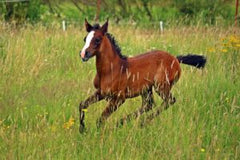
Iodine
Iodine is essential for reproduction, growth, feed utilization and temperature regulation. In order for thyroid hormones thyroxine and triiodothyronine to be produced iodine must be present to be incorporated into the hormone. An iodine-deficient mare may have a foal with goiters because the thyroid gland becomes enlarged to try and compensate to produce adequate levels of thyroxine. Signs of selenium deficiency in a foal include; stillborn foals or weak foals that can't stand and nurse, rough hair coat, contracted tendons, limb deformities, and abnormal bone development. Like selenium, foals rely on their mother's milk to meet their iodine requirements during nursing.Crucial Vitamins for Mares and Foals
Vitamin A
Vitamin A is instrumental in reproduction, differentiation of epithelial cells, immune function, embryogenesis, and growth. Hay contains almost no vitamin A because of the oxidation that occurs during curing and storage. Therefore, mares need to be supplemented with vitamin A. Depletion of vitamin A reserves in pregnant mares was found within two months of a diet of hay and vitamin A-free concentrate. Feeding a supplement, like Horse Guard, that contains Vitamin A will help ensure the safety of the pregnancy and the foal. Foals from mares that were vitamin A deficient had lower growth rates for the first 12 months of their life than mares supplemented with vitamin A throughout pregnancy. Both vitamin A deficiency and toxicity negatively affect growth, body weight, and rate of gain in young horses, as reflected by impaired cell proliferation and differentiation. Bones in foals that are vitamin A deficient are shorter and thicker than foals with adequate vitamin A levels because vitamin A affects bone remodeling. It is important that the mare receives adequate levels of vitamin during pregnancy and nursing to maintain an adequate vitamin A status in the foal.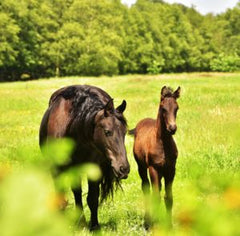
Vitamin E
Vitamin E aids in immune function, nerve and muscle function, growth, and cell membrane integrity. Mares should be supplemented with a product like Horse Guard that contains vitamin E throughout pregnancy to ensure colostrum and milk concentrations are adequate for the foal at birth. Supplementation of vitamin E in the 30 days before foaling has shown to increase the passive transfer of antibodies to the foal through increased colostrum antibody IgG and IgM levels. Vitamin E is also especially important during the last few months of gestation as tissue rapidly synthesizes in the foal and forming cardiac and skeletal muscles. Stiff, weak muscles can occur from vitamin E deficiency, including the tongue which affects the foal's ability to nurse. Contracted tendons are also associated with vitamin E deficiency. Vitamin E works synergistically with selenium with immunity and muscle function. It is important that your supplement contains vitamin E and 3 mg of organic selenium for your mares to ensure optimal health of your mare and foal.Vitamin D
Vitamin D plays a vital role in maintaining blood calcium levels by intestinal calcium uptake, bone mineral release, and resorption of calcium by the kidney. Although not as common of a deficiency, mares that are stalled or that live in northern latitudes, such as the north one-third of the United States and Canada are at the highest risk of vitamin D deficiency. A foal that isn't receiving adequate amounts of vitamin D will in turn have more brittle bones. Vitamin D has also shown to affect appetite, growth, and muscle function. Feeding a supplementation vitamin D during pregnancy will help to ensure a healthy foal is foals with a healthy immune system and strong bones.Putting it all Together
A proper balance of all vitamins and minerals is very important for the overall health of your mare and foal. While calcium and phosphorus are commonly understood to be crucial during pregnancy, it is important to be aware of the micro minerals and vitamins that are key to health as well. Supplementing your mare with a great vitamin-mineral supplement will ensure that micro minerals requirements of your mare and foal are being met during pregnancy and while nursing. Once the foal is weaned, start them on their own vitamin-mineral supplement. Horse Guard, Super Weight Gain, Mega-Dose, and Trifecta all contains a great vitamin-mineral package for your mare and foal, and allow you to cater the best supplement to your mare's individual needs. When putting a lot of time, effort, and money into breeding these beautiful horses give them the best chance to grow up strong and healthy by providing them the best nutrition possible. Horse Guard products will help ensure a happy, healthy, high-performance horse.
Can I give my Donkeys Trifecta supplements?

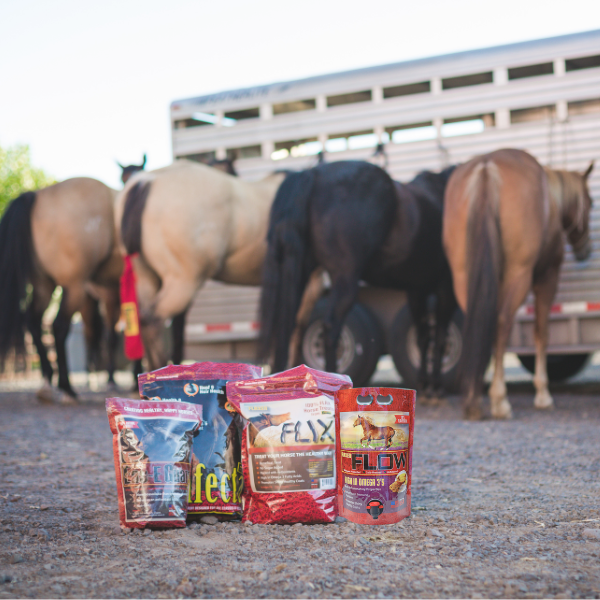
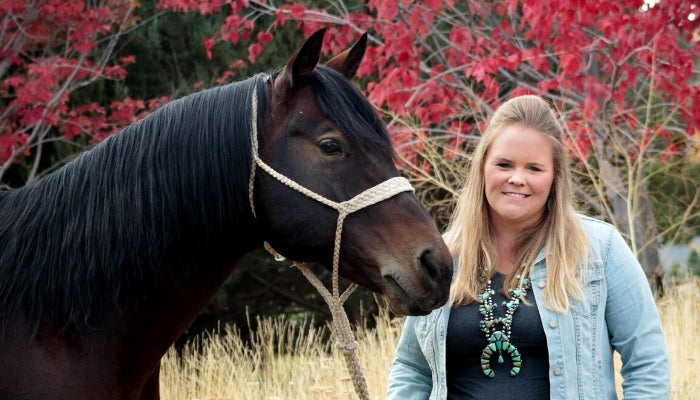



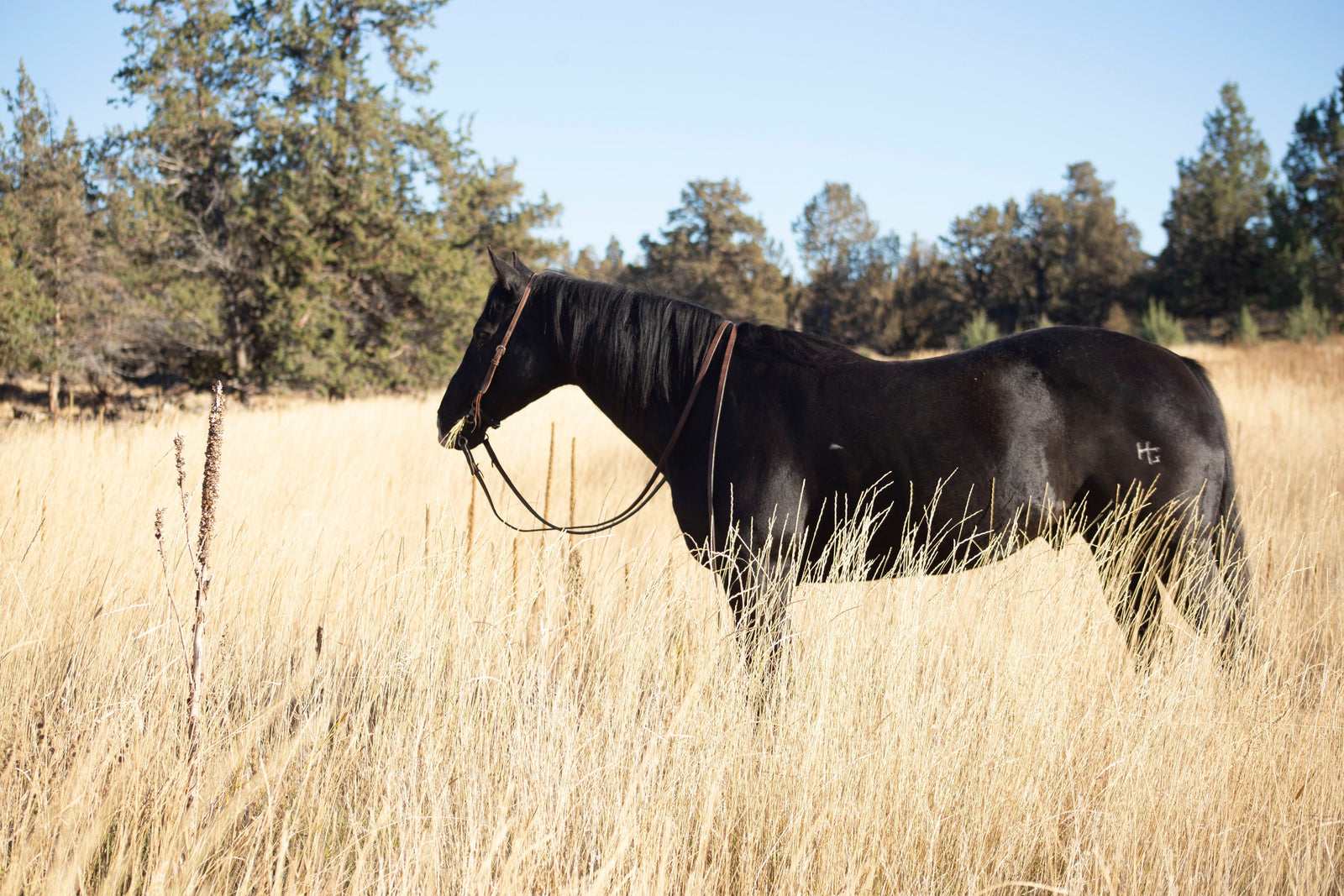
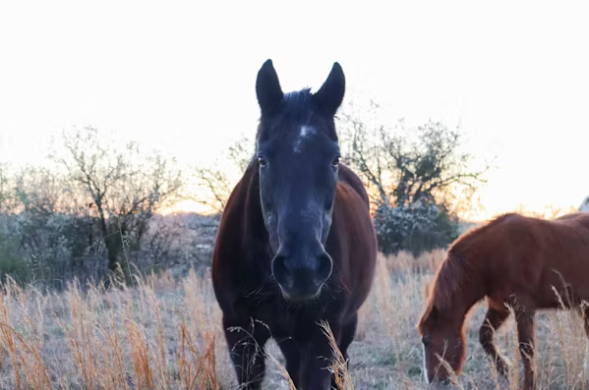
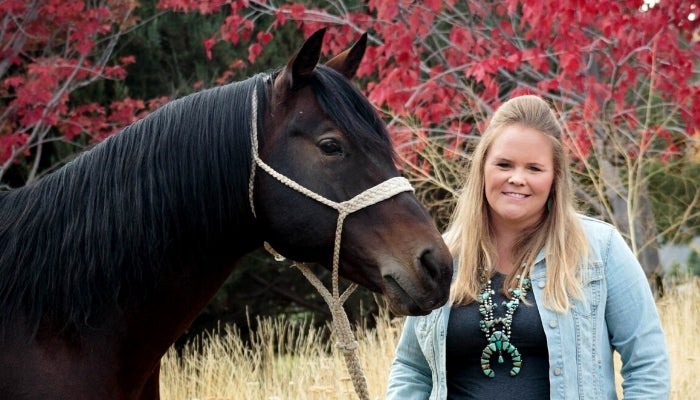
Dr. Kelsey J. Nonella Ph.D., P.A.S.
January 18, 2021
Debbie,
Yes, Trifecta is safe for Donkeys. Check out our “DONKEY, MULES, & PONIES Q&A and NUTRITIONAL ARTICLES” for more info on Donkeys.
Thank you,
Dr. Nonella